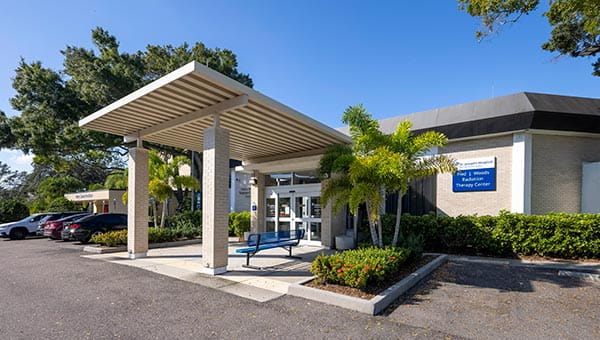Why Choose Us
BayCare will soon offer a convenient, local treatment option for cancer patients in West Central Florida to receive proton therapy. Proton therapy is a highly advanced form of radiation therapy that uses precise proton particles to target and treat tumors with exceptional accuracy while sparing healthy tissue.
What is Proton Therapy?
Photon Therapy vs. Proton Therapy: What's the Difference?
The more commonly available photon radiation treatment, that’s been used for decades, travels through the body like X-rays and exposes healthy organs to low-dose radiation as it exits. With proton therapy, charged subatomic particles can be targeted to pinpoint locations in the body without going beyond the tumor target and release a confined burst of energy to destroy and halt cancer cells. By specifically targeting tumors in this way, protons can uniquely reduce damage to nearby healthy tissues in the body. This leads to fewer side effects and has been shown to improve patient outcomes in many cancer types. Some studies show that patients treated with proton therapy can return faster to daily activities or work following treatment, indicating better recovery times as well.
Find a Location

St. Joseph's Hospital
Fred J. Woods Radiation Therapy Center
4508 N. Habana Ave.
Tampa, FL 33607
Additional Information
Advantages of Proton Therapy
Patients battling cancers near delicate or vital organs or body parts are the best candidates for proton therapy. Examples of these cancers include:
-
Brain Cancer
Proton therapy shows benefits in protecting neurologic functions like speech, vision and memory. By sparing normal brain tissue, proton therapy can reduce the chance of long-term cognitive decline when treating brain cancer.
-
Head and Neck Cancers
Head and neck tumors near the skull base can lie near important nerves, blood vessels or the brain stem. Proton therapy can avoid these structures with millimeter accuracy and reduce negative effects to these sensitive areas. In cancers located near the mouth, proton therapy has also been shown to better spare the tongue, leading to improved long-term preservation of taste.
-
Prostate, Colorectal and Gynecologic Cancers
Proton therapy can help shape the treatment to reduce damage to the bladder, bowels, genitalia and other pelvic-area organs. This may help preserve important pelvic functions in the long term.
-
Breast and Lung Cancers
By minimizing radiation to the heart and lungs, particularly for tumors on the left side of the body closer to the heart, protons help avoid unnecessary heart exposure, reducing the risk of heart damage or heart attacks, making proton treatment potentially safer.
-
Tumors Near or Affecting the Spine
Proton therapy can precisely target tumors near or around the spinal cord, reducing the risk of damaging nerves that control movement or sensation. It minimizes potential damage to the esophagus, lungs or heart, which are often located in front of the spine during conventional radiation treatment.
-
Abdominal Cancers (e.g., liver cancer, pancreatic cancer)
Proton therapy may limit unnecessary radiation dose to critical organs like the liver, kidneys and bowels. Sparing the kidneys and liver with protons is especially beneficial for patients who need these organs to function well, so they can continue receiving chemotherapy and other anti-cancer treatments from their oncologists.
-
Bone Tumors
Proton therapy is particularly effective in treating hard-to-treat bone tumors, such as chordoma and chondrosarcoma . It can deliver a very high dose of radiation while safely minimizing damage to surrounding tissues.

Helping Pediatric Patients Grow Up
Proton therapy can provide long-term benefits for pediatric patients, specifically the ability to limit damage to healthy, growing tissue near tumors in children. This treatment not only reduces short-term side effects but also promotes healthier growth by sparing developing tissue from radiation in this vulnerable young population. BayCare’s proton center is a vital and advanced resource for children battling cancer in Tampa Bay.
Frequently Asked Questions
-
Why aren't all patients treated with proton therapy?
Proton therapy is a specialized treatment that isn’t for everybody. Many times, traditional photon (X-ray) radiation provides the same or better treatment as proton therapy. Your doctor’s decision about using proton therapy will be based on the body area and type of cancer requiring treatment. Studies show only 10-15 percent of all patients receiving any type of radiation therapy showed a meaningful benefit from protons. BayCare’s multidisciplinary cancer care team will work with you to determine the best course of treatment for your unique needs and to see if you’re one of the special cases where protons may offer a benefit. If proton therapy is deemed appropriate for you, then our team of experts will guide you through the process and work with you and your insurance company to ensure a smooth access to treatment.
-
What are the common side effects associated with proton therapy treatment?
Patients treated with proton therapy more commonly experience mild skin pinkening (similar to sunburn) in the treatment site and fatigue. Both side effects resolve after treatment. Other side effects depend on the part of the body being treated and may include temporary difficulty eating or drinking, mild headaches, mild nausea, loose stools or other side effects. Talk with your radiation oncologist about what to expect during and after treatment.
-
When will the proton therapy center begin accepting patients?Construction of our proton therapy center broke ground in September 2024. We expect to begin treating patients in the new center in 2026.
Find an Oncologist.
Call (844) 370-4439 or fill out the form to ask for a referral to a BayCare cancer expert.

